Shame on you: when sexual addiction inspires cinema

Shame's poster, starting tomorrow in theaters, promised to promise fantasies of soiled sheets. Forget: this is the clinical and terrifying autopsy of a sexual predator who distils serious discomfort. A very current subject for this film with glacial eroticism, transcended by Michael Fassbender (interpretation prize at the Venice Film Festival).

Looking at Shame, we have an impression of déjà-vu. The impression of already knowing this character of trader New Yorkers gifted in the business gnawed by internal demons. Difficult, indeed, not to think of the Demon, phenomenal novel of Hubert Selby Jr (1976) and this character of yuppie self-destructive in the sclerotic society of the American dream. Years later, Michael Fassbender embodies another character drowning in the "never-sleeping" urban metropolis, a fallen angel of the modern genre to fantasies and desires long exhausted by web pornography and tariffed reports. The actor was already the headliner of Hunger, the previous feature of Steve McQueen (nothing to do with the Hollywood actor). Obsessed with physical and mental confinement, the young Scottish filmmaker straight from contemporary art and video dissected the martyrdom of hunger striker Bobby Sands in Maze Prison, Northern Ireland, in 1981. A priori , not much to do with his next movie. And yet ... The freedom to kiss is synonymous with inner prison and shame refers to a deep feeling (the death of desire in a society under a bell). McQueen clarifies his intention by citing Milan Kundera's novel "Immortality": "Shame is not based on a fault we have committed, but the humiliation we feel at being who we are and the feeling unbearable that this humiliation is visible everywhere. "
In Shame, Fassbender is laid bare, literally and figuratively, from the very first images where he hides nothing from his anatomy. A frontal way to present Brandon, a dick on legs, unable to control his sexual drive, having succeeded professionally, the perfect plastic but secretly suffering the gaze of others. In order to understand that it is only the reflection of a clinical and consumerist environment, McQueen evolves this character in anonymous places: in the subway infested with tramps and women potentially nymphos, the office between the meeting rooms inhospitable and corseted employees in their well-ironed costumes, in nightclubs and bars with artificial lights where men and women shunned seeking warm in the cold and, obviously, in his apartment as icy as him with white walls and windows that make you want to jump into the void.
At the antipodes of puritanism, the point of view is interesting because it shows sexual addiction (sex as a drug) as we have never seen in the cinema and does not treat this subject lightly. McQueen reviews all contemporary neuroses to redefine hedonism, desire and enjoyment today (Internet, prostitution, back-room), the computer virus "symbolizing" the hero's virus. Psychic ray, beyond ultramodern loneliness, this malaise is explained by the presence of a suicidal sister (Carey Mulligan, so fragile in this world of brutes), as if at heart this neurosis was stirring a family curse uniting brother and sister in the same existential gulf and the same intolerance to happiness. Is there joy? No. Shame is a painful experience. You have to go confident, ready to receive shots that do good. As a happy coincidence of timing, we find the new sex-symbol Fassbender in Carl Jung in A Dangerous Method, David Cronenberg, great filmmaker of sex in all its states. Beautiful program in perspective.

Looking at Shame, we have an impression of déjà-vu. The impression of already knowing this character of trader New Yorkers gifted in the business gnawed by internal demons. Difficult, indeed, not to think of the Demon, phenomenal novel of Hubert Selby Jr (1976) and this character of yuppie self-destructive in the sclerotic society of the American dream. Years later, Michael Fassbender embodies another character drowning in the "never-sleeping" urban metropolis, a fallen angel of the modern genre to fantasies and desires long exhausted by web pornography and tariffed reports. The actor was already the headliner of Hunger, the previous feature of Steve McQueen (nothing to do with the Hollywood actor). Obsessed with physical and mental confinement, the young Scottish filmmaker straight from contemporary art and video dissected the martyrdom of hunger striker Bobby Sands in Maze Prison, Northern Ireland, in 1981. A priori , not much to do with his next movie. And yet ... The freedom to kiss is synonymous with inner prison and shame refers to a deep feeling (the death of desire in a society under a bell). McQueen clarifies his intention by citing Milan Kundera's novel "Immortality": "Shame is not based on a fault we have committed, but the humiliation we feel at being who we are and the feeling unbearable that this humiliation is visible everywhere. "
In Shame, Fassbender is laid bare, literally and figuratively, from the very first images where he hides nothing from his anatomy. A frontal way to present Brandon, a dick on legs, unable to control his sexual drive, having succeeded professionally, the perfect plastic but secretly suffering the gaze of others. In order to understand that it is only the reflection of a clinical and consumerist environment, McQueen evolves this character in anonymous places: in the subway infested with tramps and women potentially nymphos, the office between the meeting rooms inhospitable and corseted employees in their well-ironed costumes, in nightclubs and bars with artificial lights where men and women shunned seeking warm in the cold and, obviously, in his apartment as icy as him with white walls and windows that make you want to jump into the void.
At the antipodes of puritanism, the point of view is interesting because it shows sexual addiction (sex as a drug) as we have never seen in the cinema and does not treat this subject lightly. McQueen reviews all contemporary neuroses to redefine hedonism, desire and enjoyment today (Internet, prostitution, back-room), the computer virus "symbolizing" the hero's virus. Psychic ray, beyond ultramodern loneliness, this malaise is explained by the presence of a suicidal sister (Carey Mulligan, so fragile in this world of brutes), as if at heart this neurosis was stirring a family curse uniting brother and sister in the same existential gulf and the same intolerance to happiness. Is there joy? No. Shame is a painful experience. You have to go confident, ready to receive shots that do good. As a happy coincidence of timing, we find the new sex-symbol Fassbender in Carl Jung in A Dangerous Method, David Cronenberg, great filmmaker of sex in all its states. Beautiful program in perspective.








